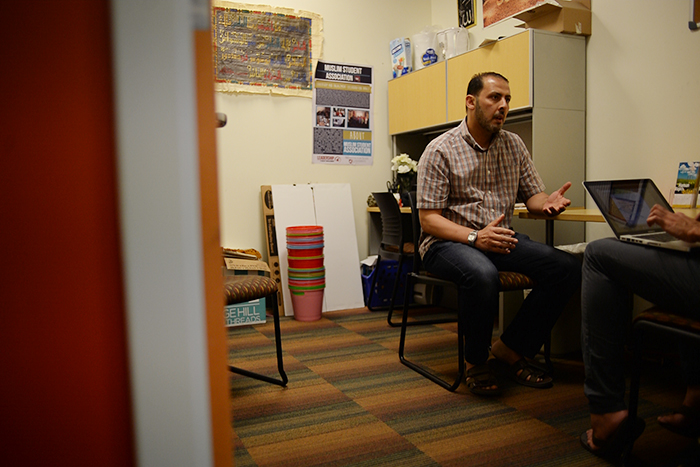MSA prayer room inadequate for Muslim population
LUKE HOLLISTER | The Daily Evergreen
MSA President Adel Almesmari ran for office to keep the current MSA room, CUB Room 307. Students utilize resources at MSA to learn more about Islam, but the room size discourages participation.
July 12, 2017
Muslim students are one of the most significantly increasing minorities on WSU’s campus since the 1980s, and students have raised concerns about a bigger prayer room.
Muslim students have a registered student organization, the Muslim Student Association (MSA), located in an office room on the third floor of the CUB. The room has been used for praying and club meetings.
Muslims have five mandatory prayers a day, three of which are during classes in the middle of the afternoon, in addition to the Friday prayer, which follows a short speech about the faith. Muslim students usually pray during the gaps between their classes in the MSA room.
The sense of diversity Muslim students bring to WSU presents a new cultural aspect about Islam and its predominant countries. Despite the negative media portrayals about the faith, students find the MSA to be a welcoming resource to learn about Islamic rituals and code of ethics.
The MSA prayer room serves 150 students, but cannot fit more than seven students at a time, MSA President Adel Almesmari said.
MSA was granted space in the CUB during the spring semester of 2011. The space available at the time was CUB Room 307, and the location hasn’t changed since.
In the past two years, the organization has gone through a lack of student participation and stagnant leadership. The MSA elections were pushed back until they found candidates to run for office just to keep the room.
Despite the concerns about the room size and the increasing number of students, no requests for a bigger room have been submitted. Therefore, students were later discouraged from using the room and abandoned the club activities.
The application forms are open in October for the spring semester and in March for the fall. Applications are sent to the CUB Space Allocation sub-committee, Griffin Uchida, coordinator of facilities and operations at the CUB, wrote in an email.
“We haven’t received any requests for a bigger room since 2012,” Uchida wrote.
Almesmari decided to run for office and implement changes to the organization last spring semester.
“I wanted to represent the MSA and make sure we have a bigger room that accommodates an average of 25 students, especially on Friday prayers,” Almesmari said.
The CUB is challenged with a limited physical capacity. Last spring, seven organizations applied for a room in the building, and none were granted space.
“If there was a larger room available, we would be more than grateful for that,” Uchida wrote.
There have been recent suggestions to have a bigger prayer room at the Elson S. Floyd Cultural Center. The center, however, won’t have any student club rooms. Some of its amenities include an open living room, space for larger events, gender neutral bathrooms, a commercial and demonstration kitchen, outdoor seating and cultural art.
The center will be completed in late July, and the facility will be handed over to the university for administration. The center will officially open in the fall semester of 2017.
The Chinook Student Center opened recently with different student facilities that could be an option for prayers.
“There are two meditation pavilions on the Chinook center ground floor for any student spiritual practices. They are open without any prior reservations,” Director of the CUB Sean Greene said.
The Chinook rooms, however, can’t guarantee Muslim students a fixed spot for praying on Friday if the rooms are taken.
“Having a bigger room on campus will help us hold more meetings, accommodate more students for prayers and expand our club activities,” Almesmari said.
Most major universities have bigger MSA centers nationwide. The University of Washington, for instance, has an Islamic House that hosts potlucks, Friday prayers, guest seminars and other club events.
Perhaps it’s time for WSU to similarly give Muslim students the physical space that would allow them to flourish and have a more significant representation on campus.






















